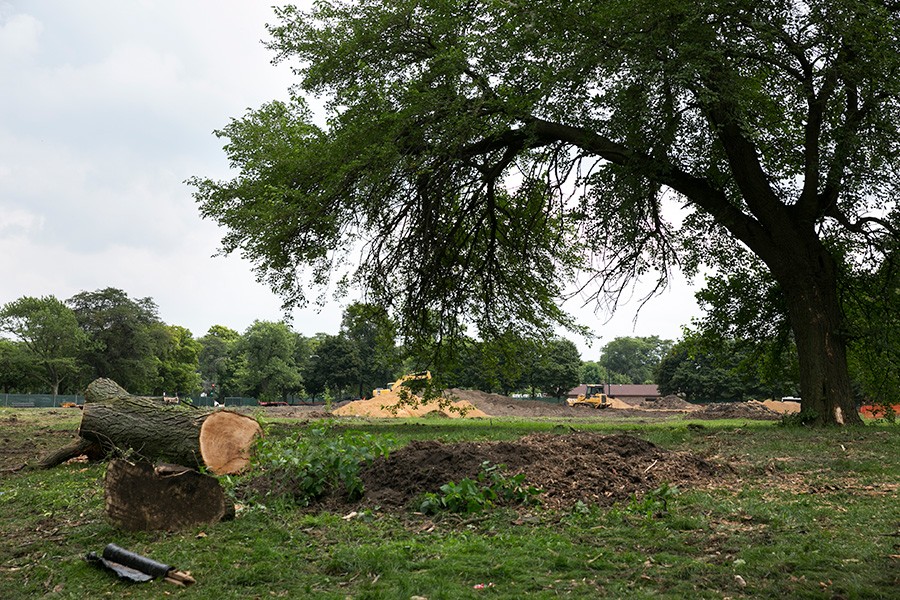A lawsuit to prevent the Obama Presidential Center’s ‘illegal land grab’ in Jackson Park is moving forward
The activist group Protect Our Parks claims that the city’s plan to turn 19 acres of Jackson Park over to the Obama Foundation is unconstitutional.
If a tree falls in Jackson Park these days, you can bet it’ll be noticed.
Reports last week that the Chicago Park District has been chopping down century-old trees in the park definitely got the attention of environmental activist Charlotte Adelman and the mostly low-key environmental group Protect Our Parks. The trees were getting axed to clear space for a running track that has to be relocated because it’s currently on land needed for the Obama Presidential Center.
As it happens, Protect Our Parks—founded a decade ago to keep a Latin School soccer field out of Lincoln Park—was already in court over the Obama Center. A federal lawsuit it filed May 14 against the city and Park District charges that the plan to turn 19 acres of Jackson Park over to the Obama Foundation for use as the site of the OPC is illegal.
It will instead be a museum, community hub (with gym and auditorium), and training center for political leaders, both local and international. It’ll include a library, but nothing like a National Archives-managed research facility. Instead, according to an agreement reached this spring, it’ll house a 5,000-square-foot Chicago Public Library branch in a rent-free space leased from the Obama Foundation and staffed by CPL.
The Obama presidential papers (currently parked in a locked warehouse in Hoffman Estates, where they were moved after Obama left office) will be maintained by the National Archives and Records Administration in a government facility somewhere else. NARA will eventually get the papers digitized, and then we’ll be able to access them online at the Obama Center—and probably anywhere else, on our phones.
Why did Obama decide to be the first president to dump the library part of the presidential library? Maybe because digitization—which would have happened anyway—is the future. Maybe to make things easier for researchers (some of whom, tired of trekking to, say, Little Rock, have argued that a central location for all presidential papers would facilitate scholarship). Or maybe because he’ll be the first ex-president to be whacked by a change in the law that’s raised the price tag on presidential libraries in a big way.
In 1986, Congress passed a law that required handing NARA an endowment for operating costs for any new presidential library equal to 20 percent of the construction costs of that library. Then in 2008 Congress raised the bar: starting with Obama, any president seeking to establish a library would have to fund an endowment equal to at least 60 percent of the cost of the library’s construction.
If the entire Obama Presidential Library complex were to cost $500 million to build and was to be operated by NARA, the Obama Foundation would have to provide an endowment of $300 million. Alternatively, if only one of the three buildings was designated as the NARA-operated presidential library and the rest of the complex were to be operated by the Obama Foundation, the required endowment would be 60 percent of the cost of the library building only—still a significant obstacle.
Last week the Obama Foundation issued its first annual report, revealing that the foundation raised $232 million in 2017, spent $22 million on operations and programs, and at the end of the year had net assets of $224 million. That is, less than half of what it’ll probably take just to get the buildings up.
(The foundation, which still needs a city ordinance finalizing its deal for the Jackson Park site and also has to survive two yet-to-unfold federal reviews, announced last month that the groundbreaking for the OPC, which was slated for this year, has been moved to some unspecified date in 2019.)
So it’s likely that cost savings figured into Obama’s decision: Without the presidential library, there’s no NARA involvement and no gargantuan endowment demand. It’ll no doubt be cheaper to deal with the CPL than with NARA.
But there was a downside to that decision. The shift from a government facility to a privately run center made the Jackson Park site look to some like an increasingly egregious “illegal land grab.” Already concerned about the environmental impact, Adelman, an environmental author and past president of the Women’s Bar Association of Illinois, says she called Protect Our Parks president Herbert Caplan, a former first assistant Illinois attorney general and veteran of the Harold Washington-era city law department, and suggested a lawsuit; they began to strategize over lunch at the Ogilvie Transportation Center last winter. Protect Our Parks and Adelman became two of the four original plaintiffs in the case. (The other two are Maria Valencia and Jeremiah Jurevis.)
Their suit, filed by the law firm of Mark D. Roth and former alderman Bob Fioretti, argues that the transfer of Jackson Park land from the Park District to the city so that the city can turn around and hand the land over to the Obama Foundation (via a 99-year renewable lease for $1) is a violation of the Park District Code, state law, due process requirements, and the public trust doctrine. They claim that the city and Park District are acting beyond their authority and that a 2015 amendment to the Illinois Museum Act—passed to legitimize the deal—is illegal and invalid. Also, the complaint charges, since Obama has said he’ll “continue his political activities” at the OPC, using public tax money to help support the center is a violation of the First Amendment rights of citizens who might disagree with his politics.
Mayor Rahm Emanuel has labeled the lawsuit “frivolous,” and the city argued in court that it was premature because the land lease arrangements weren’t yet final (and won’t be until the city passes a new ordinance, which it expected to introduce in July). Also, the city claimed, no Obama Center construction was yet happening in Jackson Park. U.S. district court judge John Robert Blakey accepted that rationale and put the suit on hold.
But, Roth told me last week, the ordinance was not introduced in July, and the City Council doesn’t meet again until September. Meanwhile, trees are falling. Last Wednesday, he filed a new motion asking the court to get the case moving.
“The Park District can’t [legally] transfer the land to the Obama Foundation,” Roth said. “So what they’re doing is transferring it to the city, which is then transferring it to the Obama Foundation. They’re trying to do indirectly what they can’t do directly. That’s illegal.
“Now we find out that—contrary to everything they said in court—they’re knocking down 100-year-old trees in Jackson Park to accommodate the Obama Center,” he continues. “Our motion says [their] reason for the delay was a ruse.”
What about the fact that we already have museums in city parks? Caplan says “the fact that unconstitutional acts were not previously [recognized as such] doesn’t magically make them constitutional when challenged in court.” He offers some examples: “slavery, segregated schools, laws against abortion and same-sex marriage.”
And Caplan wants to make one other thing clear: “The object of the lawsuit is not to prevent the Obama Center from being constructed. Our objective is just to relocate it out of the public park and into any of the nearby areas that are in need of investment.”
In court on Tuesday, lawyers for the city and Park District claimed that the new track and field have nothing to do with the subject of the suit, which is the Obama Presidential Center; Fioretti argued that “it’s all tied at the hip;” and Judge Blakey lifted the hold he’d previously put on the case, though he didn’t stop work on the track. The city will now have to respond to the lawsuit; they’ll all be back in court for a status hearing on October 24. v







